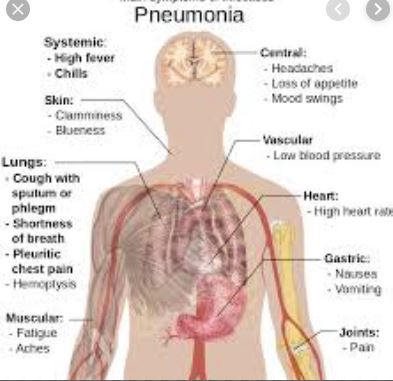What is the Difference Between Hypothermia and Pneumonia?
difference between hypothermia and pneumonia is that Here we will tell you what the difference is between hypothermia and pneumonia, since many people confuse their symptoms and think it is the same disease.
No one likes to be sick; However, sometimes it is inevitable that we get a flu and more if our immune system is low or we are exposed to people who are sick, as they can infect us. There are countless diseases that manifest with different symptoms.
Hypothermia
Hypothermia is a disease that manifests when the body’s temperature is too low to the normal temperature that the body requires for proper performance and metabolism. Normal body temperature should be around 36.5 degrees Celsius and hypothermia is diagnosed when body temperature is less than 35 degrees Celsius.
Signs and symptoms of hypothermia:
Uncontrolled chills
Speech difficulty
Gradual loss of mental clarity, lethargy, confusion, memory loss
Slow breathing
Gradual loss of physical ability, loss of coordination
Cold skin
Paleness
Hypothermia can cause the body to go into a coma and eventually death. It is important to increase the temperature of people suffering from hypothermia.
Pneumonia
Pneumonia is a general term used to describe various types of pulmonary inflammation. This disease frequently occurs in children, the elderly and people who are immunocompromised. Not contagious, however, it is an incurable lung disease and without timely treatment any type of pneumonia can be fatal.
Pneumonia can affect one or both of the lung parenchyma, which are caused by various factors. The most common factors of pneumonia are viruses and bacteria. Although some are caused by the inhalation of chemical or other substances that irritate the lung parenchyma and cause it to swell. Below we explain what are the different types of pneumonia and their main causes.
Viral pneumonia
This type of pneumonia is caused by a virus that infects children, the elderly and immunocompromised people. They are the most susceptible to this type due to their low immune system. Viral pneumonia manifests as follows:
Throat swelling
Cough with phlegm or dry cough
Mild or severe headache
Cold
Inflammation or swelling of the lymph nodes
Chest
discomfort General malaise of the body
Mild seizures
Bacterial pneumonia
This type of pneumonia is caused by an infection of gram-positive or gram-negative bacteria, but the most common bacteria that cause this lung condition is Streptococcus pneumoniae. The signs and symptoms that manifest in this type of pneumonia are much more serious compared to viral pneumonia and is more common among adults and immunocompromised people. It manifests as follows:
Cough with phlegm
Difficulty breathing
Cyanosis (bluish coloration of the lips and nails caused by lack of oxygen)
Discomfort and chest pain
Nausea associated with abdominal pain
Pain and muscle weakness
When bacterial pneumonia is in an advanced stage, the person expels blood through cough which is analyzed.
Aspiration pneumonia
This type of pneumonia is caused by the inhalation of foreign substances, such as: chemical gases, liquids, dust particles and other irritants. The signs and symptoms are not always serious and can be resolved in a few days. But in some cases the aspiration of food, liquids and vomiting can be harmful and can cause respiratory arrest and even death. Common symptoms of aspiration pneumonia are:
Dry cough
Chest pain
Wheezing when breathing
Difficulty breathing.
Atypical pneumonia
Atypical pneumonia is caused by Mycoplasma pneumoniae. This type is generally mild and produces the same type of symptoms as bacterial pneumonia. Atypical pneumonia develops gradually and shows no serious symptoms until after several days of being infected.
Pneumonia can affect anyone, but it can be treated without hospitalization, except in severe cases. Pulmonary diseases should not be taken lightly especially in children, the elderly and immunocompromised people. Therefore, if you get any of the symptoms described above, see your doctor.
- What is the Difference Between Hypertrophy And Hyperplasia?
- What is Difference Between Antiseptic And Antibiotic?
- What is Difference Between Homologous And Analogous Structures?
- What is the Difference Between Bacterial and Viral Meningitis?
- What is the Difference Between Exons and Introns?
